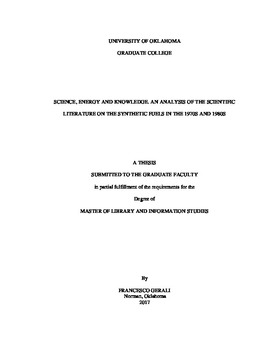| dc.contributor.advisor | Abbas, June | |
| dc.contributor.author | Gerali, Francesco | |
| dc.date.accessioned | 2017-08-02T14:48:34Z | |
| dc.date.available | 2017-08-02T14:48:34Z | |
| dc.date.issued | 2017-08-01 | |
| dc.identifier.uri | https://hdl.handle.net/11244/51882 | |
| dc.description.abstract | Research breeds research. When the environment (politics, human and capital resources, and the demand for the good) is right, research activity compounds itself. The growth rate continues until research activity is at the limiting level which its environment can support. However, what influences the work-flow of the research, and what is the limiting level? Does there really exist a breaking point where the scientist gives up discouraged by the surrounding and overwhelming odds? (Clewell, 1963).
This study documents the trend of scientific research on synthetic fuels production technologies between 1972 and 1988. The goal is to understand if the environment has really influenced the research; and, whether it is possible to determinate or not a precise breaking point in the flow of the research.
The conclusions reached in this thesis are based on the comparison of historical facts through the lens of a bibliographic study on the contemporary technical-scientific literature available from the Department of Energy. | en_US |
| dc.language | en_US | en_US |
| dc.subject | Library Science | en_US |
| dc.subject | History of Science | en_US |
| dc.title | SCIENCE, ENERGY AND KNOWLEDGE. AN ANALYSIS OF THE SCIENTIFIC LITERATURE ON THE SYNTHETIC FUELS IN THE 1970S AND 1980S | en_US |
| dc.contributor.committeeMember | Weldon, Stephen | |
| dc.contributor.committeeMember | Van der Veer Martens, Betsy | |
| dc.date.manuscript | 2017-08-01 | |
| dc.thesis.degree | Master of Library & Information Studies | en_US |
| ou.group | College of Arts and Sciences::School of Library and Information Studies | en_US |
